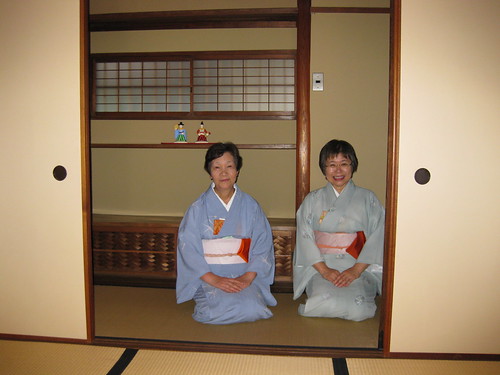
Japanese elderly are increasingly taking care of each other. - Howie Severino
- In last week’s Asahi Shimbun, one of the leading newspapers in Japan, was a heart-breaking sign of this nation's endangered future: News of a growing number of senior citizens killing their spouses. According to the report, the killings were not committed out of anger but exhaustion. "I couldn’t take care of him anymore," one 72-year-old wife said of her disabled husband, 78. She was arrested and is now in jail. As Japan’s population ages, more and more of its people are needing around-the-clock care, but there aren’t enough younger people willing to do it. So the elderly are taking care of each other. That trend will continue unless Japan adopts what seem to many here to be drastic policies towards immigration and foreign labor. Japan is also one of the few advanced societies left that have severely restricted the entry of foreigners who could fill the widening gaps in the work force. Japan is already the grayest nation on earth. Government data show that the number of people aged 65 or over is more than 21 percent of the total population, recently surpassing the previous oldest population, Italy. As Japanese women produce fewer babies, the elderly are living longer, with an average life expectancy of 79 for men and 85 for women. Facing the prospect of economic and social stagnation, Japan faces a crucial Solomonic choice in the near future: allowing more foreigners in but diluting its proud homogeneity. That fuels nativist fears of disturbing the social harmony that has made Japan one of the safest and most stable nations in the world. "Japanese are conservative," says Dr. Taketoshi Okuno, the president of Osaka Prefecture University in this city. "They like being a homogenous society. But businesses will soon have to hire more foreigners. That will have an effect on the rest of society." Unlike other prosperous Asian societies such as Singapore, Hong Kong and Malaysia, Japan also does not permit domestic helpers from abroad. "The Japanese don’t like strangers living in their homes," a Philippine diplomat based in Japan said. But domestic help could free Japanese women to enter the work force rather than stay home and raise children.

Many Japanese senior citizens live alone or only with their pets. - Howie Severino
As Japan wrestles with its dilemma, the Philippines and other labor-rich nations are poised to send in its workers. The Japanese government has recently opened the door to its health care sector slightly, allowing the first 100 Filipino nurses to come in. But according to the Philippine diplomat, the nurses have to take intensive Japanese language classes first for six months while working as nursing assistants and they must pass a stringent licensure exam. He added that the difficult Japanese language could be too high a barrier for many to overcome in a field where personal communication is often a life-and-death matter. While one sector of the economy is slowly being pried open, another has virtually been shut. Entertainment – which mostly consisted of little more than having drinks with Japanese men at bars – was one of the few industries where the Japanese had liberal labor policies. Clubs and bars had once employed as many as 80,000 Filipino women across Japan at one time, spawning the term Japayuki. But in 2004, the Japanese government abruptly restricted entry of entertainers after it was accused by the United States of abetting human trafficking. Today only around 5,000 women have been given working visas for entertainment in Japan, according to Philippine diplomatic sources, and all of them are now required by law to be bona fide singers or dancers with two years of work experience in another country. Factories requiring menial labor have gotten around strict labor policies by hiring foreign "trainees," and not workers. These trainees are only given allowances, which still exceed their wages back home. But they basically do more factory work rather than any technical training. To some Japanese analysts, the prospect of a crippling labor crunch is just an offshoot of a Japanese insularity that the country must break out of so it can stay in step with the rest of the world. "We must learn the values of diversity and flexibility," says Dr. Hisanori Kato, a sociologist and Southeast Asia expert who has been working to bridge the gap between ordinary Japanese citizens and its Asian neighbors. He extended the invitation to this writer to visit Japan partly for this purpose. Cultural exchanges may one day make ordinary Japanese comfortable with having foreign workers in their hospitals, factories, and even households. But as Japan ages, the demands of the marketplace might compel Japanese industry and government to welcome citizens of poorer countries, before many Japanese are entirely comfortable with the idea.
- GMANews.TV 






